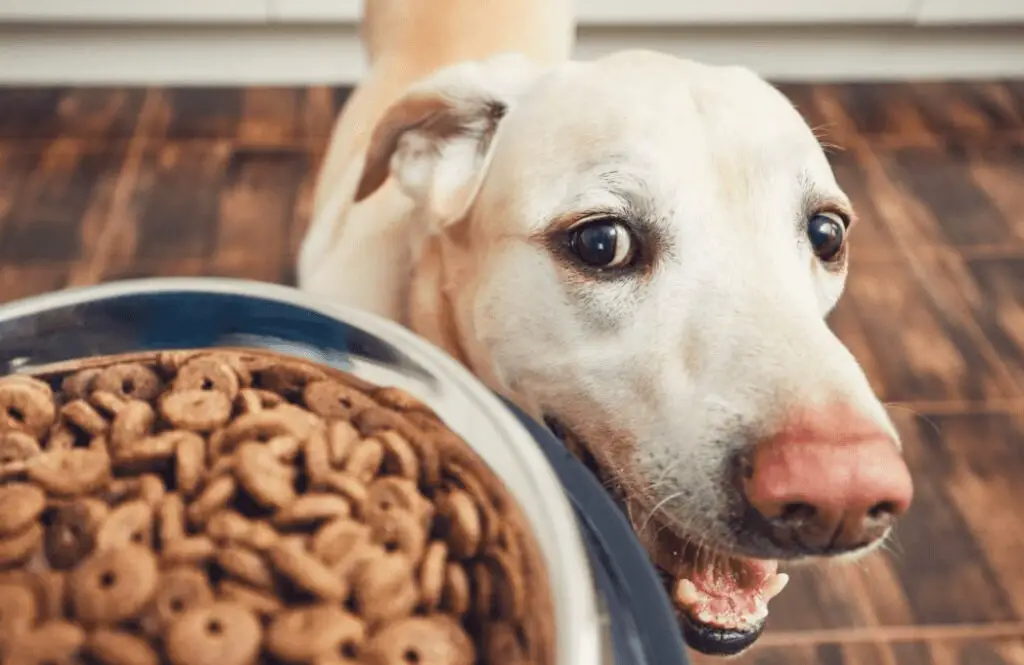A puppy is one of us, isn’t it? But when you bring a lab puppy home, you must be perplexed and excited. If how to care for a labrador puppy seems daunting, well today we will help you there! Here’s how
Firstly, ensure your lab puppy has access to clean water and food at all times. Go for a high-quality commercial puppy’s diet like Royal Canin or prepare meals at home
- Remember that exercise is crucial for a lab puppy’s health.
- Also, Regular grooming is a must for lab puppies.
- Brush their coat frequently, especially during shedding season.
- Bath your new labrador puppy every few weeks
Facts You Need To Know on how to raise a lab puppy
Nature And Temperament Of A Lab
The Labrador retriever was bred at first as a gun dog. There are hunter-dogs named after their origin, the Labrador region in the United Kingdom.
Despite being retriever gun dogs, labradors are friendly, intelligent, kind, outgoing, and high-spirited. Many dog owners like to have labs as companions because of the very nature of the breed. Labrador Retrievers don’t necessarily have favorite family members like many other hunter dogs.
The Need To Puppy-Proof
Puppy-proofing your home should be your primary focus when you bring home lab puppies. We need to understand the various stages of development in a puppy’s life to tune our homes properly.
For example, when the baby teeth come out during teething, you must be careful of objects the puppy might chew up. You don’t want electrical wires or furniture chewed up. Be careful of house plants.
Puppy proofing is necessary to keep your new puppy safe and in good health and care. Here’s a helpful checklist of the things to put out of your puppy’s reach when you bring him home.
- Trash: Get closed trashcans or keep them on a high surface the puppy can’t reach.
- Rugs and carpets: Your puppy needs to be potty trained and might confuse training pads for carpets. Some puppies also chew up carpets and rugs while teething.
- Medicines: Ensure any medications are far out of your puppy’s reach.
- Poisonous products: These could be in your garden, garage, toilet cleaning products, washing detergent, batteries, etc. Keep an eye out for poisonous liquids your dog might ingest, and keep them far above or out of sight.
- Case your wires: Curious pups eat up everything – wires for your lamps, mobile and laptop chargers, etc. The chew-resistant casing can be a great help here against your puppy’s teeth
Leave everything in cupboards and shelves! Dogs think that everything is fair game as long as it’s scattered. They eat up shoes, and slippers can rip up clothing, upholstery, toothbrushes, pens, pencils, and more. It may be funny at the moment, but the laughter goes away when you have to rush to the veterinarian for an ingested TV remote.

Lastly, Why Labrador Retriever Puppies?
- Labs enjoy 10 to 12 years of happy and spirited living.
- They’re friendly and physically fit and free of health conditions (aside from their senior years), and
- They’re the picture of what we imagine to be man’s best friend. Rest assured. A Labrador is one of the best things for your kids to grow up around.
How To Care For A Lab Puppy: Responsibilities
When you bring home a labrador puppy, you become privy to many responsibilities. This includes providing good care and ensuring they have all the nutrition, exercises, and training.
How to Set Lab Puppies Up for Successful Training?
The key to setting your lab puppy up for training is to reward them when they do it right. Practice negative reinforcement when they don’t. Any form, be it potty training, obedience training, leash training, and so on, requires your dog to explicitly be told that they’re doing it right or wrong.
The way is through positive reinforcement (rewards for good behavior) and negative reinforcement (removing something for bad behavior). Of course, a dog can’t understand your words, so we use treats, praise, and petting as rewards.
A reward enables your lab puppy to repeat good behavior. Negative reinforcement instills fear in your puppy. It leaves the puppy confused and leaves behind some trauma. Reinforcement is most commonly used to train puppies. It has to start immediately because dogs can’t correspond to two actions after a point.
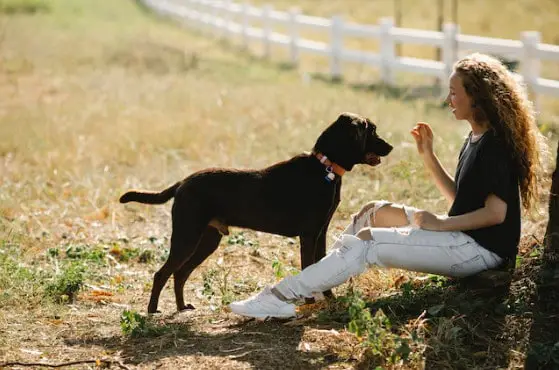
How to Feed Your Lab Puppies for Optimal Growth?
Remember that a puppy must be fed enough to meet their growing (and rapidly changing) needs. Ideally, a puppy must drink her mother’s milk until she is about four weeks old. After that, they begin to wean, but regular milk works if the mother is not around. Here are a few notes on how to feed your growing labrador puppy:
- Puppies need calories to fuel their growth! Feed yours three meals a day until they reach the six-month mark. After six months, two meals a day is enough.
- Puppies younger than 8 weeks need soft or wet food – now this can be either store-bought puppy food soaked in warm water to make it spongey or homecooked food. Here are some recipes to make wet puppy food at home.
- Follow labrador growth and weight charts to ensure you’re not overfeeding or underfeeding your pup. Change the meals’ quantities and prevent your pup from becoming obese.
How to Socialize Your Labrador Retrievers?
Socializing a lab puppy is crucial and must begin within the first three months of your puppy’s life, both with strangers and other dogs. This is important to avoid your pup becoming aggressive and not well-adjusted.
You don’t want your dogfighting with other dogs and biting your friends, family, veterinarian, or groomer. Other consequences include excessive barking, snapping, growling, and fear.
The socialization window is between 3 and 16 weeks when the animal is curious and less wary of danger around them. After this period, it can be challenging for you and the dog to create a healthy atmosphere for socialization.

Key Stages In A Lab’s Life And How To Care & Train
Labradors usually live for 10 to 12 years. However, many labs have been known to live up to 14 or even 16 years with impeccable care. Throughout these years, they go through various stages, and you must be in the loop about what each entails. This allows pet parents to see if their dog is on the right track, if he needs additional care, or to be checked by a veterinarian.
Newborn Labs – Up To 10 Week Old Labrador puppy
Most rapid developmental stages in a puppy’s life, and a pet parent needs to adhere to a strict routine here. You need to potty train your pup, socialize them, vaccinate/immunize them, and get them on a good feeding and pooping schedule.
House Training
Potty training is vital because it helps your pet understand where to do their business and keep clean. You don’t want to be cleaning your dog’s waste every half-hour or come back from a long day to a stinky home.
This falls under house training your curious pup, and there are multiple methods. Remember that the key to potty training is a tight schedule and a designated place for labs to relieve themselves.
Puppy Training Pads
Puppies cannot be taken out frequently because they’re small and can get tired. Besides, they should only be taken for walks after vaccination, not before the eight-week mark.
You may ask where they can relieve themselves if they’re not taken for walks – the answer is puppy training pads! These are liquid-proof, lined pads that aid your puppy in understanding that they cannot simply pee and poo anywhere.
It requires vigilance and guidance on the part of the puppy owner to guide him to the pad. Using training pads also requires you to know how often your puppy needs to relieve himself (differently-aged dogs have differing pee and poo requirements). This is how you keep your puppies house-trained.

Crates for Labrador Puppy Care
Many dislike the idea of crate training as it requires one to confine their pet to a crate. However, having your puppy accustomed to crates is an invaluable necessity. Once accustomed, dogs like sitting in crates and find it relatively comfortable. Crates resemble “dens.” They seek safety (you may have noticed dogs digging holes in sand or dirt to sit comfortably). However, it would be best if you did not keep your dog crated or caged all day.
- Have a crate just enough for the dog to turn around but not big enough to walk about. This prevents the puppy from peeing or pooping inside the cage.
- Believe it or not, dogs also dislike when their spaces are dirty! Your pup may defecate a few times but will stop if it causes discomfort.
- If you see your pup whining, barking, scratching, or trying to get your attention another way, react. He is signaling that he wants to go to the bathroom, which is when you take him for a walk.
- At this point, you need to be wary of when your puppy calls out for you; otherwise, he might do his business in the crate.
- Timely walks during crate training are the key to potty training your dog perfectly.
Socialization
Labrador puppies are active dogs known for being outgoing and friendly, so socializing tends to be simple. Here’s how to socialize your puppy:
- Taking your puppy for frequent walks for interaction. Regular walks also accustom your puppy to new sounds, smells, and sights. Visits to dog parks, public parks, and dog-friendly markets are also helpful.
- Invite people often, allowing your puppy to interact with more humans. Even better if your guests come over with their dogs! This prevents separation anxiety.
- Puppy love play dates! If you know somebody with a new puppy, set a play date for the two (or more). Give them chewing toys, have some treats handy, and allow them their space to play.
- Be wary. While you know how your dog may or may not behave, you don’t know the same about others. Watch closely when your puppy is playing with another puppy so you can intervene in case something goes wrong.
Grooming
There are two ways to groom labrador retriever puppies – professional grooming or baths at home. The idea is to keep your pet clean and tidy. When your pups spend a lot of time playing, they risk catching ticks, fleas, mites, and other pests.
- Tick fever and other illnesses caused by parasites can be incredibly harmful to your puppy. Make sure to comb for ticks frequently, especially if you often spend quality time outdoors.
- Grooming also includes ear and teeth cleaning to avoid infections in these areas.
- Nail cutting, and haircuts, keep your dog looking as well as feeling healthy.
- Keeping your puppy clean with pet wipes is advisable until they are at least 8 weeks old.
- You may bathe your puppy at home after the 8-week mark. Why? – Adult dogs generally can self-regulate their body temperature, but puppies cannot. Pups run the risk of both becoming too cold and hot.
Start giving your puppy quick baths at home at 8 weeks and hold off till he’s 12 weeks old to take him to a professional groomer for the first time. Your pup may also feel frightened at being left alone at the groomer. Refrain from fretting because this is where his socialization training will help.
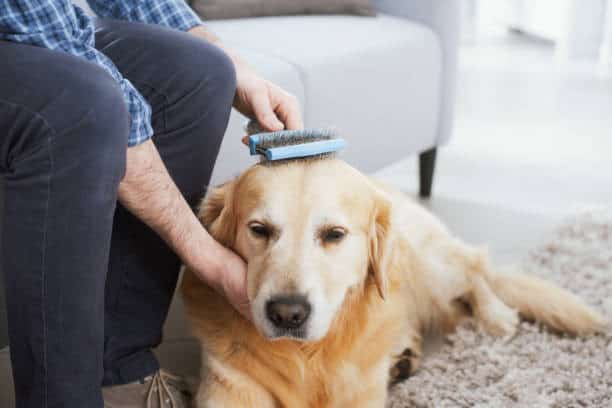
Vaccinations As Per the American kennel club
Immunization has to begin before the 10-week mark. Given that the immune systems are developing until six months, immunize your puppies on time. According to the American Kennel Club, puppies should ideally be fully vaccinated against a long list of diseases by the time they are 16 weeks old (starting from 6 weeks).
These diseases, once contracted, are treatable but not curable. Here’s a list of vaccinations as per the American Kennel Club a puppy requires by 16 weeks:
- Canine Distemper
- Parvovirus (Parvo)
- DHPP (Distemper, Canine Hepatitis Adenovirus, Parvovirus, and Parainfluenza)
- Rabies – first at 16-18 weeks, then every 1 to 3 years as the law requires.
The optional vaccinations for puppies are:
- Bordatella
- Lyme Disease
- Leptospirosis
- Canine Coronavirus (different from human coronavirus)
- Kennel Cough (if you plan to have your dog interact with other dogs often, this one’s important)
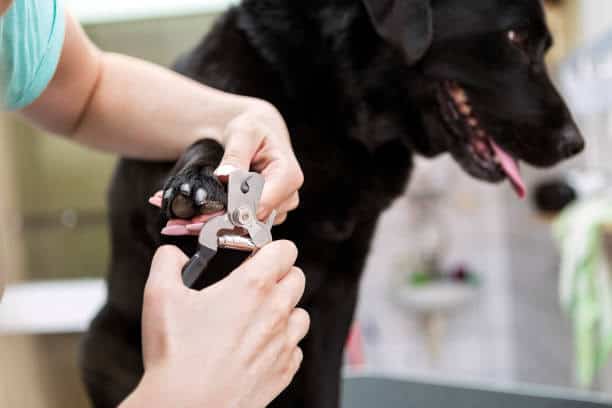
Deworming
Deworming refers to giving your new dog a pill or syrup to free it of parasitic worms. Worms can come out in the poop or via vomit and can be seen by the dog owner. This is why it’s necessary to examine your puppy’s poop.
While an adult dog requires deworming every three months or so, puppies require the same more often. Even though their mother may be dewormed, parasites can often pass over to the baby dog during birth. The following deworming schedule is appropriate for growing labrador puppies:
- Between birth and 3 months – every 2 weeks
- Between 3 and 6 months – once a month
- After 6 months – every 3 months
Teething
Labradors usually start teething at about 2 weeks. Mind you, although they’re puppies, these teeth are razor-sharp. Pups can use them to scratch, bite, and even tear up things. Teething can be painful, itchy, and uncomfortable, and puppies usually feel the urge to chew up things at this point.
Instead of letting them chew up your furniture, invest in chewable toys. Ideally, only give them one or two toys/chewables at a time. Cold and frozen foods can also soothe the discomfort. Ice cubes work, though many dogs don’t like to bite into them.
Alternatively, you could freeze some meat broth into cubes and feed them to them. Not only does this relieve the growing pains, but it also makes for a fun treat!
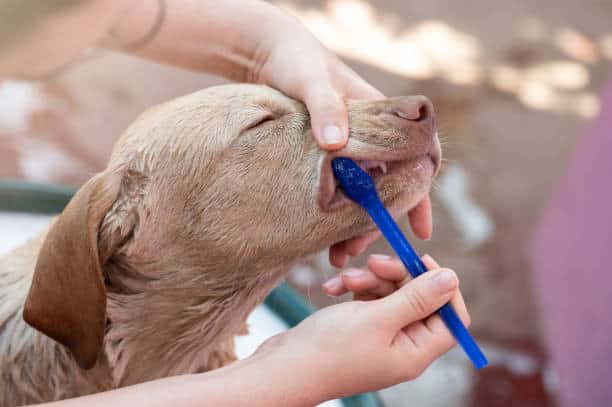
The Juvenile Stage – 16 week old- 24-week-old labrador puppy
Around four to six months, or the juvenile stage, labradors are almost done with their growth and ready to wreak havoc. Your lab must be potty trained, vaccinated, dewormed, and socialized by this point. Remember, these are your responsibilities as a pet owner.
It’s important to help your lab find outlets for this energy. Playing with them, taking them for long walks, and taking them to the dog park help. What’s most important here is your furry friend learning some basic skills to make your life easier.
This includes leash and obedience training for basic commands (sit, stand, no, off, down, stay, drop it, come, and so on). Basic training can be carried out both by you or a puppy trainer. Training your puppy is a fun activity for you and your dog pet.

Leash training
Teaching your puppy best how to behave while on walks is essential. You can select whether you’d like your adult dog likes to wear a collar or a harness.
- Most use a collar for home and a harness for walks to prevent hurting the neck during outdoor activity.
- You must teach your dog you are in charge, even though they might lead you.
- Do not reinforce the puppy’s habit of pulling on the leash
- Reward them when they walk calmly beside you, which is how they should ideally be trained.
- Refrain from training your pup to run along with an extended leash, which can be dangerous. For example, rather than pulling your pup back from in front of a moving vehicle and risking hurting him, it’s better to walk him right beside you to avoid such a situation in the first place.
- Frequent walks aided with treats and play for good behavior are the key to appropriately leash training your labrador puppy.
Obedience training
Make your dog listen when you command them to act, such as sit, stand, come, down, etc. This is the most basic form of training to raise a well-mannered doggo. You don’t want an unruly pet that misbehaves and doesn’t listen to you. Thus obedience training is mandatory. There is a multitude of ways to go about training your lab.
Your best bet is an experienced trainer who can teach your puppy the basic commands and fun tricks like roll over, turn around, high five, paw, and more. Oh and get them a dog house.
Other Activities
A few other skills labradors may hone at this stage is learning to walk up and down stairs. Labradors have large bodies and relatively small legs, so climbing stairs can be dangerous if not done right.
Help your lab walk up and down steps slowly; you could use your puppy’s leash for this if you’d like. Swimming comes naturally to dogs; many boarding centers, groomers, and vet clinics offer doggy swimming pools. It’s good exercise for your pup and helps if you often go for treks or like to partake in water adventures.
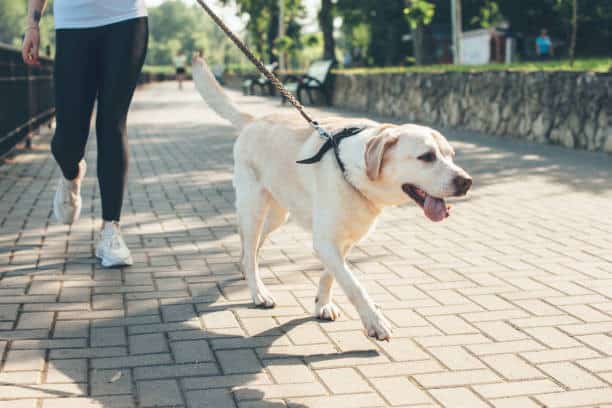
Adolescent Period – 24 week old- 72 week old labrador puppy
This stage warrants the continuation of obedience training, so it is instilled in the pup for his lifetime. These babies look like adult labs but are still puppies at heart and in their behavior.
Here’s where you may successfully transition from soft food to hard food. You can also start taking your puppy for jogs at this stage because they’re strong for that level of physical exercise.
Must-Know Health Tips For A Lab Pup-Owner
First and foremost, know that your best dog is cute, but they’re also hard work. Only get one if you have the time to manage and train them.
Nutrition And Dog Food For A Lab
Ensure your pup gets enough nutrients in his dog food so you don’t need to take expensive supplements and vitamins later. Lay off the kibble and give your dog more home-cooked solid dog food. Raw food works, but be careful
Natural treats like sweet potatoes (peeled), cucumber, watermelon (de-seeded and peeled), carrots, and other veggies can be super nutritional for your dogs. It should be a mix of wet and dry food
Fun Fact: Dogs love peanut butter, and it’s healthy! Peanut butter has a strong smell which can mask that of medications. Use it both as a snack with veggies or to administer oral medication.
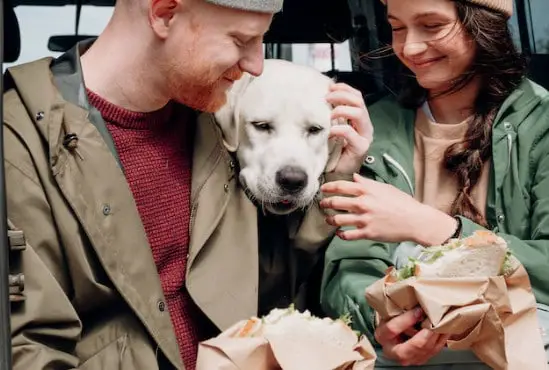
Watch Out For Health Issues!
Although Labradors are generally healthy dogs, they are notorious for developing particular health problems.
- Hip dysplasia and arthritis: Owing to the dwarf gene in many labs resulting in large dogs with relatively shorter legs. Consistently watch your dog’s weight and refrain from overfeeding him.
- Progressive retinal atrophy and cataracts: Many labradors may inherit eye problems. Look out for cloudy, red, or puffy eyes, bumping into objects, and pawing at the eyes.
- Tumors: uterine and testicular tumors (cancerous as well as benign) are common in dogs that are not spayed/neutered, which can cause seizures and other problems
If you don’t plan to mate him, having your dog spayed/neutered around when he reaches the two-year mark is advisable.
FAQs on Labrador Puppies
How Often Does My Labrador Puppy Need To Visit The Veterinarian?
Seeing that puppies need vaccinations every few weeks till a certain age, your lab needs to go to the vet about once a month until he’s 4 months old. After this, reduce this to once a year or so for regular checkups, leaving aside emergencies.
When Can My Labrador Puppy Switch From Soft Food To Hard Food?
You may begin transitioning your puppy’s food from soft to hard food at about 10-12 weeks when they are stronger and have almost all their teeth.
Can I Give My One-Month Old Labrador Puppy A Bath?
Bathing your puppy before the eight-week mark is not advisable; one must be supremely careful. Labs don’t develop their body temperature self-regulation until they’re about 8-10 weeks old, so bathing your puppy before this can harm her significantly.
What Are The Healthiest Treats For My Labrador?
Store-bought organic treats are good, but the healthiest are always home-cooked. Veggies like carrots, celery, broccoli, green beans, and cucumber (often with peanut butter) are wonderful for your puppy (only after they switch to hard food).
Are Labradors Difficult To Take Care Of Compared To Other Breeds?
Labradors are healthy and outgoing breeds that are not difficult to care for. However, only get your pups from reputable breeders.
Why Am I Not Able To Potty Train My Labrador?
With potty training, consistency, and a tight schedule are key. Check your method – you may need to be more attentive when your pup needs to go for a walk or may not be taking him for enough walks. Make sure to create a good schedule and, more importantly, stick to it.
How Do I Punish My Labrador Puppy Without Scaring Him?
If your puppy has done something wrong, give her a timeout or take something away, like her toys. Ensure not to be intimidating – avoid screaming, shouting, or using physical punishments. This can cause more harm than good. A loud clap, a yelp (in case of biting), or ignoring your pup for a short while works.
How Often Should I Give My Labrador A Bath?
You can bathe your labrador once a month – more frequent baths can dry out their skin and give way to rashes and infections, and less frequent baths can leave your lab stinky and dirty.
How Big Do Labrador Puppies Become?
Male labradors are generally much larger than female labradors. The dog grows between 50 and 80 pounds, with male labs on the higher side. Male labs are also taller and longer than females, usually around 20 to 25 inches tall.
Do I Need To Buy Toys For My Labrador Puppy?
Think of puppies as children (because they are!) who need several stimulants to focus their attention. Labradors, as a breed standard, are naturally playful, so it’s a good idea to get them some toys to play with. Fun toys or their own bed create a stress-free atmosphere. Consider getting a frisbee and teaching your dog how to catch it and play frisbee with you.
Author Profile

- Lifetime dog Enthusiast
- Shradha is a seasoned writer at Labradorandyou.com, an authoritative resource for all things Labrador Retriever. Her experience as a pet owner and dog enthusiast drives her to create meticulously researched and fact-checked content, offering valuable insights on Labrador training, grooming, and health. Each article reflects Shradha's passion and dedication, enriched by personal experiences with her beloved Labradors, Tom, and Kurt. Whether exploring breed-specific training techniques or providing product reviews, Shradha ensures Labrador owners receive the most accurate, up-to-date, and trustworthy information, aimed at enhancing their companions' health and happiness


